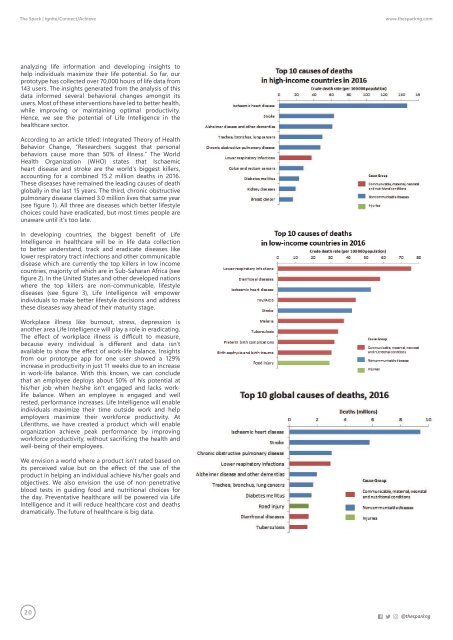July 2018
Create successful ePaper yourself
Turn your PDF publications into a flip-book with our unique Google optimized e-Paper software.
The Spark | Ignite/Connect/Achieve<br />
www.thesparkng.com<br />
analyzing life information and developing insights to<br />
help individuals maximize their life potential. So far, our<br />
prototype has collected over 70,000 hours of life data from<br />
143 users. The insights generated from the analysis of this<br />
data informed several behavioral changes amongst its<br />
users. Most of these interventions have led to better health,<br />
while improving or maintaining optimal productivity.<br />
Hence, we see the potential of Life Intelligence in the<br />
healthcare sector.<br />
According to an article titled: Integrated Theory of Health<br />
Behavior Change, “Researchers suggest that personal<br />
behaviors cause more than 50% of illness.” The World<br />
Health Organization (WHO) states that Ischaemic<br />
heart disease and stroke are the world’s biggest killers,<br />
accounting for a combined 15.2 million deaths in 2016.<br />
These diseases have remained the leading causes of death<br />
globally in the last 15 years. The third, chronic obstructive<br />
pulmonary disease claimed 3.0 million lives that same year<br />
(see figure 1). All three are diseases which better lifestyle<br />
choices could have eradicated, but most times people are<br />
unaware until it’s too late.<br />
In developing countries, the biggest benefit of Life<br />
Intelligence in healthcare will be in life data collection<br />
to better understand, track and eradicate diseases like<br />
lower respiratory tract infections and other communicable<br />
disease which are currently the top killers in low income<br />
countries, majority of which are in Sub-Saharan Africa (see<br />
figure 2). In the United States and other developed nations<br />
where the top killers are non-communicable, lifestyle<br />
diseases (see figure 3), Life Intelligence will empower<br />
individuals to make better lifestyle decisions and address<br />
these diseases way ahead of their maturity stage.<br />
Workplace illness like burnout, stress, depression is<br />
another area Life Intelligence will play a role in eradicating.<br />
The effect of workplace illness is difficult to measure,<br />
because every individual is different and data isn’t<br />
available to show the effect of work-life balance. Insights<br />
from our prototype app for one user showed a 129%<br />
increase in productivity in just 11 weeks due to an increase<br />
in work-life balance. With this known, we can conclude<br />
that an employee deploys about 50% of his potential at<br />
his/her job when he/she isn’t engaged and lacks worklife<br />
balance. When an employee is engaged and well<br />
rested, performance increases. Life Intelligence will enable<br />
individuals maximize their time outside work and help<br />
employers maximize their workforce productivity. At<br />
Liferithms, we have created a product which will enable<br />
organization achieve peak performance by improving<br />
workforce productivity, without sacrificing the health and<br />
well-being of their employees.<br />
We envision a world where a product isn’t rated based on<br />
its perceived value but on the effect of the use of the<br />
product in helping an individual achieve his/her goals and<br />
objectives. We also envision the use of non penetrative<br />
blood tests in guiding food and nutritional choices for<br />
the day. Preventative healthcare will be powered via Life<br />
Intelligence and it will reduce healthcare cost and deaths<br />
dramatically. The future of healthcare is big data.<br />
20<br />
@thesparkng








